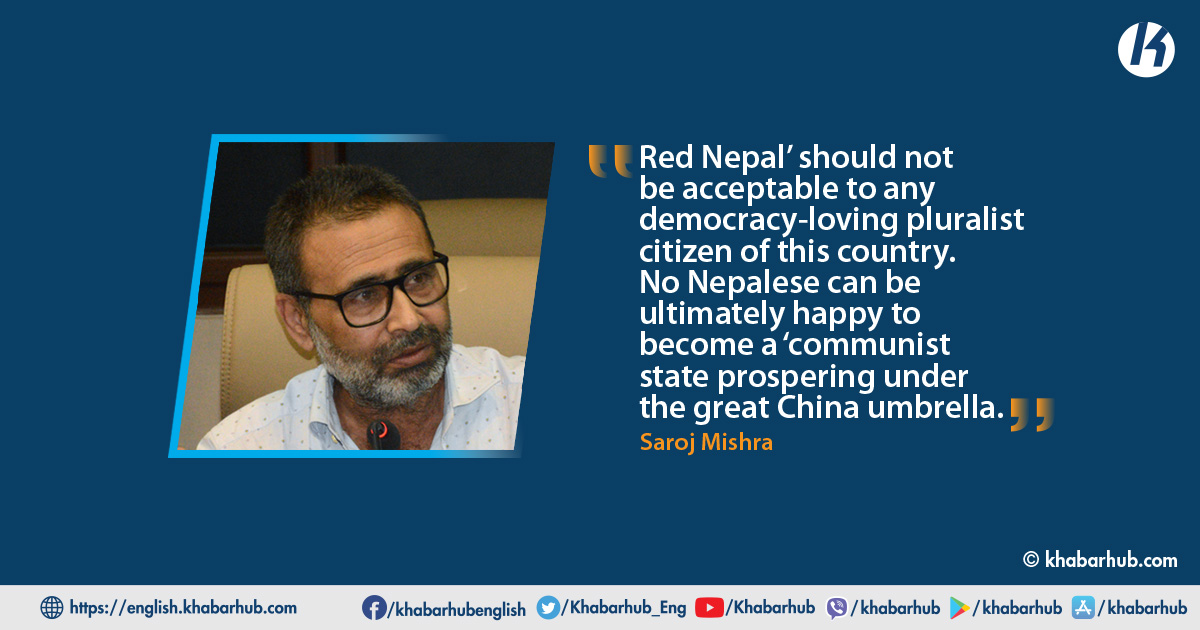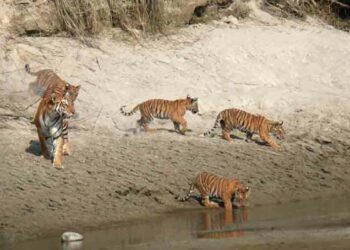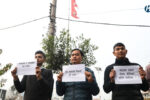Millennium Challenge Corporation (MCC) grant of $500 million offered to Nepal is in almost jeopardy. A big section of citizens of the tiny country seems to be vehemently opposing this inflow of grant.
Slogan echoes of ‘No MCC’ can be heard commonly on the streets of Kathmandu these days. Every second television channels are engaged in talk shows and discussions in favor of or against MCC. It could be almost impossible for an outsider to understand why are the people protesting against a generous grant?
Nepalese are rejecting grants! Yes, a grant! No cost for money is involved and no repayment is required! They don’t want the free fund!
They don’t want it because there are certain terms and conditions for the fund. They strongly feel that the terms of the grant encroach into the sovereignty of their motherland, Nepal.
They believe that the American army would permanently occupy Nepal under the cover of MCC. The leading personalities of protesting parties and groups do suspect that the MCC project is forced to Nepal with a hidden strategy of encircling their good and friendly neighbor China.
However, China itself has never expressed such concern. The ‘well-wishers’ and friends of China have volunteered to raise China’s probable concern. Isn’t this bizarre?
One might have to go back to the lanes of history to understand the whole issue. King Mahendra took over the control of the country after a royal coup in December 1960.
He overthrew the popularly elected government led by B.P. Koirala and declared himself an absolute monarch. The king introduced so-called ‘party-less democracy’ and ruled over the country with absolute authority till his death in early1972.
His successor, King Birendra continued to follow in the footsteps of his father for long years to come. It was only in 1991 that the parliamentary system with constitutional monarchy was re-established.
Common men on the street seldom understand what exactly is happening. They are normally overwhelmed by populist slogans blended with self-pride and nationalism.
The overthrown Nepali Congress-led government was believed to be supported by Nepal’s mighty neighbor, India. India, at least, was not in a position to support the king’s undemocratic move.
Almost all the major leaders including B.P. Koirala were imprisoned for many years. Few leaders and many workers fled to India seeking asylum there.
Nepal being almost an India-locked country, was heavily dependent on India. The King knew it very well that he would not survive against the hostile neighbor! Nepal’s other giant neighbor China had just been overtaken by communists led by Mao.
At the same juncture, in 1962, a war broke out between India and China. India had to face a humiliating defeat. A very crafty politician, king Mahendra, stole this opportunity, and took a very clever move by extending hands towards China.
He played the popularly termed ‘China card’ against India. He was successful in presenting China as a reliable alternative to India to the people of Nepal.
There already was an undercurrent anti-Indian sentiment among the general Nepalese, especially among the hilly population, primarily due to the ‘big brother’ attitude of India.
This type of psyche is commonly found among the population of small countries very close to a big neighbor. China, though an immediate and big neighbor, was separated by the mighty Himalayas and therefore the two sides were not in close and frequent contact.
King Mahendra, clandestinely launched a nationalistic campaign coined with anti-India ethos. Today a very strange blind support of China with narratives such as ‘China can do no wrong’ and ‘China always is helpful’ is a common mindset in Nepal.
Now to be a true Nepali, you have to be by default anti-Indian! A very paradoxical narrative has been implanted in Nepalese minds that to be an anti-Indian (and by default pro-China) is the biggest proof of being a great Nepali!
This inexplicable definition of nationalism is the reality of Nepal! India no doubt has committed many blunders to fuel this sentiment.
On the other hand. King Mahendra very cunningly also stimulated the then very small force – the communists. His motive for doing this might not have been to encourage communism in the country; he was building a counterforce against the democratic force – Nepali Congress.
Communists started to grow exponentially in the country. By the end of the twentieth century, communists were a formidable force!
Now imagine the situation! Ultra nationalism coined with the anti-Indian sentiment! Adding insult to injury was an unbelievable surge of communists in a poverty-stricken tiny country like Nepal!
Would China, a country aspiring to become a world superpower, keep quiet in her tiny neighbor state? In fact, China as per their policy of ‘brotherly relations with communists throughout the world’, was already actively engaged with the communists of Nepal.
Now when the communists are a decisive force in the Nepalese political arena, it is quite but natural that China would like to assume a pivotal role in running of Nepalese affairs.
Obviously, China does not want any sort of influence of democratic forces such as India or for that matter any influence of the democratic world in Nepal. That is simply not acceptable to China. The United States, being China’s biggest rival on the world stage, also is not acceptable.
China has started to strongly believe that Nepal can be now in its complete fold.
More than China herself, there is now a huge chunk of people who believe that Nepal is now a ‘protectorate’ of China. These people include acclaimed politicians, journalists, scholars and intellectuals.
Common men on the street seldom understand what exactly is happening. They are normally overwhelmed by populist slogans blended with self-pride and nationalism.
The above-mentioned opinion builders are the problem children. The majority of them do strongly believe that they have established the ‘People’s Republic of Nepal’. Especially after the terminology ‘geared to socialism’ being inducted in the constitution of Nepal, these people think that this is a socialist republic.
They, from inside their heart, believe that Nepal as a socialist country should be loyal to socialist China and therefore their respective communist parties should be fully faithful to the mother party – the Communist Party of China, it being the largest church of communism in the world!
These ‘faithful to China’ brand people are influential and have a substantial impact on illiterate or educated fools who are generally very emotional when the question of nationalism comes to play.
In fact, these opinion builders themselves are not nationalists; their true loyalty is towards China, not Nepal. They use the nationalism card in disguise rather than as a blackmailing tool.
I cannot say as to how these ‘opinion builders’ were so much converted to stooges! Is it the simple ideological brainwashing? Is it because of the physical strength of the ‘trainer’?
My concern is different. ‘Red Nepal’ should not be acceptable to any democracy-loving pluralist citizen of this country. No Nepalese can be ultimately happy to become a ‘communist state prospering under the great China umbrella’.
Or has the financial muscle allured them so much? I can for sure say that these people are tempted, trained, and marshaled by the People’s Republic of China! And, this is here to stay and spread!
Now let us go back to MCC.
Actually, MCC is not the problem for these ‘nationalists’. The probable good image building of the United States or the democratic world among the populace of Nepal is their principal headache.
Dilution of Chinese influence over the state machinery and general population of the country is their main concern. I do not know how this long ongoing building of Chinese encroachment to Nepalese minds went completely unnoticed to the democratic world! Nepal could be a tiny dot in the world map and hence ‘ignorable’ stuff for policymakers of the democratic world including the United States.
But most of these democratic countries have been active in Nepal for more than the last seventy years. The diplomatic missions of the UK, USA and France have been here for so long.
They must have some policy guidelines and some foreign policy objectives. These countries have been involved in so many development assistance programs in Nepal.
Could not they visualize these developments? Is Nepal a completely negligible country? Or, have they failed in reading the writing on the wall?
I am not raising these questions and inviting them to react! I am simply raising the question – have these countries failed in fulfilling their own foreign policy objectives?
The current hue and cry against MCC could be an eye-opener for the democratic world. I do not know how they would react. I am worried about the mode of their reaction.
This tiny poor country should not at any cost be turned into a battleground for so-called superpowers. If this happens one would win and another would suffer a small scratch.
Ultimately the Nepalese people will suffer a lot! Let these countries react the way they want or in the magnitude of their choice depending upon their decision on Nepal’s strategic importance from their point of view.
My concern is different. ‘Red Nepal’ should not be acceptable to any democracy-loving pluralist citizen of this country. No Nepalese can be ultimately happy to become a ‘communist state prospering under the great China umbrella’.
But, a huge chunk of the population of this country has been contaminated with this ‘revolutionary’ ideology. The clean-up process has to begin immediately and it has to be done by Nepalese themselves.









Comment